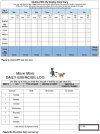Talking health, a pragmatic randomized-controlled health literacy trial targeting sugar-sweetened beverage consumption among adults: rationale, design & methods
- PMID: 24246819
- PMCID: PMC3939427
- DOI: 10.1016/j.cct.2013.11.003
Talking health, a pragmatic randomized-controlled health literacy trial targeting sugar-sweetened beverage consumption among adults: rationale, design & methods
Abstract
High consumption of sugar-sweetened beverages (SSB) contributes to a wide range of poor health outcomes. Further, few US adults drink less than the recommended ≤8 oz per day; and individuals with low socioeconomic, low health literacy status, and in rural areas are even less likely to meet recommendations. Unfortunately, few SSB behavioral interventions exist targeting adults, and none focus on low health literacy in rural areas. Talking Health, a type 1 effectiveness-implementation hybrid trial targeting adults in rural southwest Virginia, was developed using the RE-AIM planning and evaluation framework (reach, effectiveness, adoption, implementation, maintenance). The primary aim of this pragmatic randomized-controlled trial was to determine the effectiveness of a scalable 6-month intervention aimed at decreasing SSB consumption (SIPsmartER) when compared to a matched contact physical activity promotion control group (MoveMore). SIPsmartER was developed based upon the Theory of Planned Behavior and uses health literacy strategies to improve comprehension of the intervention content among participants. MoveMore is based on a research-tested intervention that was adapted to address all theory of planned behavior constructs and health literacy principles. Secondary aims include additional health outcomes (e.g., physical activity, weight) and reach, adoption, implementation, and maintenance indicators. This paper highlights the opportunities and considerations for developing health behavior trials that aim to determine intervention effectiveness, provide all study participants an opportunity to benefit from research participation, and collect key information on reach and the potential for organizational adoption, implementation, and maintenance with the longer-term goal of speeding translation into practice settings.
Keywords: Behavioral research; Beverages; Health literacy; Randomized controlled trial; Research design; Rural population.
Copyright © 2013 Elsevier Inc. All rights reserved.
Figures



References
-
- Johnson RK, Appel LJ, Brands M, Howard BV, Lefevre M, Lustig RH, et al. Dietary sugars intake and cardiovascular health: A scientific statement from the American Heart Association. Circulation. 2009;120(11):1011–1020. - PubMed
Publication types
MeSH terms
Substances
Grants and funding
LinkOut - more resources
Full Text Sources
Other Literature Sources
Medical

